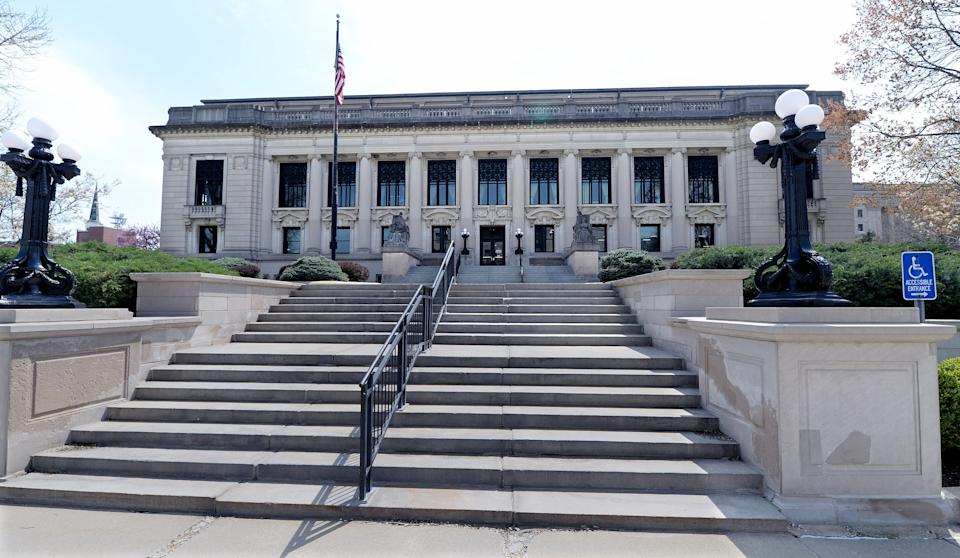Illinois Supreme Court finds no-cash bail constitutional, goes into effect in September
- Oops!Something went wrong.Please try again later.
The Illinois Supreme Court found a major criminal justice reform bill was indeed constitutional on Tuesday, which will see the state end cash bail in the next 60 days.
In a 5-2 decision, the state's high court ruled in favor of the Pretrial Fairness Act -- a portion of the Safety, Accountability, Equity, Transparency-Today Act. The vote was partisan with Justice David Overstreet and Justice Justice Lisa Holder White dissenting.
“The Illinois Constitution of 1970 does not mandate that monetary bail is the only means to ensure criminal defendants appear for trials or the only means to protect the public,” the majority stated in their opinion. “Our constitution creates a balance between the individual rights of defendants and the individual rights of crime victims. The Act’s pretrial release provisions set forth procedures commensurate with that balance.”

Come Sept. 18, judges will no longer be able to place bail on an offender but would still be able to detain those awaiting trial if they stand risk of committing more offenses or seen as liable to flee prosecution. Proponents such as Gov. JB Pritzker say this system will "ensure pre-trial detainment is determined by the danger an individual poses to the community instead of by their ability to pay their way out of jail."
Illinois Attorney General Kwame Raoul had argued a ruling against the law would have opened the doors to decades of criminal justice reform led by the state legislature. The ruling was not a surprise to him.
“The SAFE-T Act was intended to address pervasive inequalities in the criminal justice system, in particular the fact that individuals who are awaiting criminal trials – who have not been convicted of a crime and are presumed innocent – may spend extended periods of time incarcerated because they cannot afford to pay cash bail," he said in a statement. "The law ensures that the decision about whether people are detained pending trial is not based on whether they can afford to pay for their release."
More: Justice Holder White announces run for full-term on state's highest court
Also not surprised by the decision was House Minority Leader Tony McCombie, where she and many Republicans were disappointed by the ruling.
"Anyone that is familiar with the court system knows that this is not about the ability whether an offender can post bail, but a progressive movement to decriminalize crime and promote an environment for repeat offenders," McCombie, R-Savanna, said in a statement. "This policy is not about bail reform, but about elevating criminals."
Raoul again clarified the ruling did not apply to other pieces of the SAFE-T Act which modified police use of force and required the use of body-worn cameras going into effect when passed in 2021. What the ruling pertained to was only the PFA portion - the most debated issue as questions surrounded for what offenses a judge could withhold pretrial release.
This led state lawmakers to again amend the SAFE-T Act in late 2022 during the lame duck session, giving judges wider authority to detain an offender. Despite these changes, state's attorneys and sheriffs across the state, including those Sangamon County, believed the law was unconstitutional and filed suit against Pritzker, Raoul, House Speaker Emanuel "Chris" Welch, and Senate President Donald Harmon.
Sangamon County State's Attorney Dan Wright told The State Journal-Register his office has "respect" for the decision and will implement the changes with coordination among relevant parties.
“I am optimistic that the legislature will continue productive efforts to improve the legislation in the interest of public safety and dedicate sufficient funding to sustain the new pre-trial system," he said.
This case, first consolidated in Kankakee County and later heard before the state Supreme Court this spring, saw the prosecution argue the state Constitution made reference to “bail” in two sections - most notably one that states those accused of crime “shall be bailable by sufficient sureties.” The majority opinion, however, said the constitution does not explicitly stipulate that those sureties have to be by monetary means.
Recent: As police hunt suspected killer, Shafer remembered as 'magnetic force of love'
Overstreet and Holder White, both conservative judges, broke from the majority with Overstreet finding the General Assembly’s elimination of cash bail was “in direct violation” of both the state's bill of rights and the rights of crime victims guaranteed by the constitution.
“Therefore, this court has an absolute obligation to declare the pretrial release provisions of the Act to be invalid and unenforceable no matter how beneficial the abolishment of monetary bail may be,” Overstreet wrote in a dissent.
One day before the end of cash bail was scheduled to be enacted on Jan. 1, 2023, the justices issued a stay order postponing implementation while they reviewed the case. That stay will now be lifted on Sept. 18.
Contact Patrick Keck: 312-549-9340, pkeck@gannett.com, twitter.com/@pkeckreporter.
This article originally appeared on State Journal-Register: Illinois Supreme Court finding: no-cash bail is constitutional

